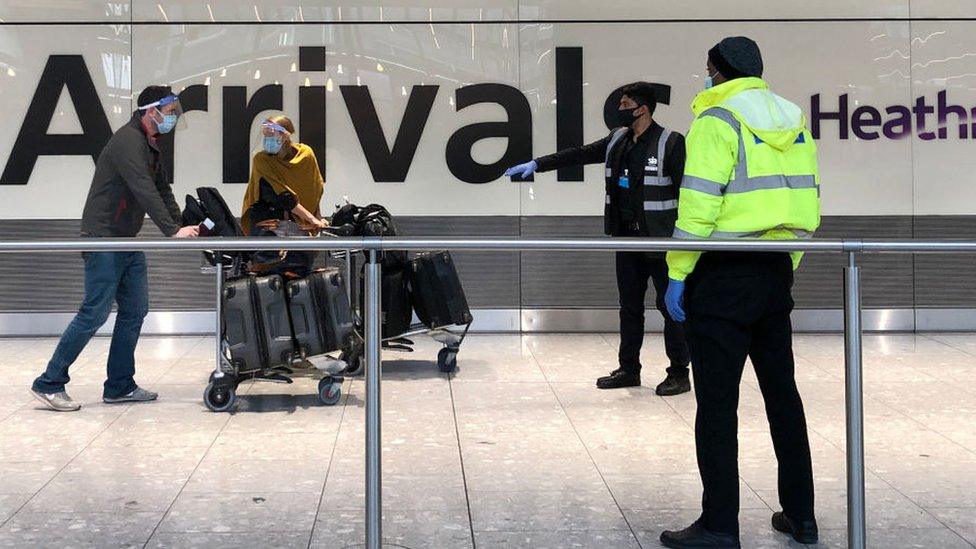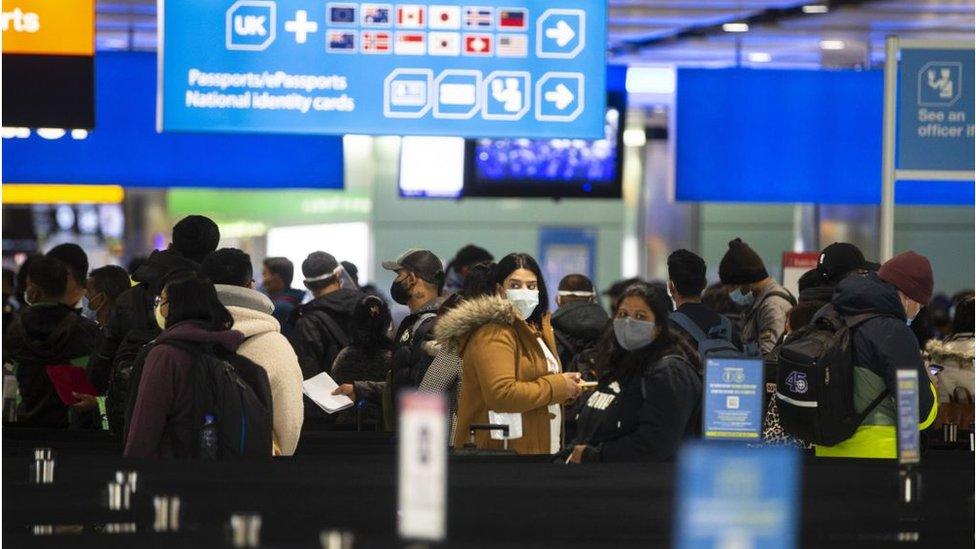Covid-19: Red list arrivals terminal opens at Heathrow Airport
- Published
- comments

A dedicated terminal for passengers arriving in the UK from countries with a high risk of Covid has opened at Heathrow Airport.
Travellers arriving on direct flights from red list nations will now transit through Terminal Three.
Heathrow said its top priority was protecting the public and helping reduce the risk of new variants.
There are 43 countries on the red list, external, but direct flights are permitted from only India, Pakistan and Bangladesh.
Direct flights are also allowed from Kenya, but the country has currently suspended air travel to the UK.
Only British and Irish nationals or UK residents are allowed to travel from countries on the list.
But anyone who has been in a red list country in the previous 10 days, whether they took a direct flight or came via another country, is required to pay for quarantine in a hotel for 10 nights after their arrival.
Jessica Echeverry, who's flown back from Colombia, says her quarantine hotel is like a "luxury prison"
However, there has been concern at reports that travellers from red list areas were mixing with other passengers in immigration halls, where they could be waiting for several hours on occasion.
It comes as a scientist advising the UK government warned of signs the country is in the early stages of a third wave of coronavirus infections.
A Heathrow Airport spokeswoman said: "Red list routes will likely be a feature of UK travel for the foreseeable future as countries vaccinate their populations at different rates.
"We're adapting Heathrow to this longer-term reality by initially opening a dedicated arrivals facility."
Are you arriving from a red list country? Email us at haveyoursay@bbc.co.uk, external.
She added that while opening the facility would be "logistically very challenging", Heathrow hoped that doing so would enable Border Force to carry out its duties more efficiently, as passenger volumes increase in line with countries on the government's green list.
But for now, the current red list system would continue, including mandatory negative Covid tests for all international arrivals, mandatory use of face coverings, social distancing, segregation and enhanced cleaning regimes and ventilation in immigration halls.
Heathrow added that its dedicated arrivals site would switched to Terminal 4 "as soon as operationally possible".
A government spokeswoman emphasised the UK's top priority was protecting the health of the public, using an enhanced borders regime to reduce the risk of new variants being transmitted.
"As we reopen international travel safely, we will maintain 100% health checks at the border and the new dedicated terminal at Heathrow for arrivals from red list countries will enable passengers to be processed as safely and as efficiently as possible, before being transferred to a managed quarantine facility," she said.
"We continue to do all we can to smooth the process, including the roll-out of our e-gate upgrade programme during the summer and deploying additional Border Force officers."


It's been three and a half months since the government first introduced quarantine hotels.
But before red list passengers make their way to the hotels for their 10 days of isolation, they were waiting in the same arrivals hall as passengers from other lower risk countries, sometimes for hours at a time. While there were separate queues, some people felt unsafe.
Although the idea of a separate red list-only terminal has been floated before, the issue has always been about who would pay for it.
After over a year of incredibly low passenger numbers, opening an extra terminal was a big cost that Heathrow weren't eager to take on.
Some felt that as the red list is a government policy, it should be the government that foot the bill.
Although neither side has confirmed who is covering the cost, it's understood that the government is now picking up a substantial part of it.
International travel is likely to remain very different for a while, as Heathrow anticipates that a red list terminal will be needed for some time.

Minimising queuing times
The Home Office told the BBC that Border Force has mobilised additional staff to help minimise queuing times for passengers who are compliant with the UK's border health measures, and that it is making sure that it has the right level of resources to maintain border security as international travel begins to open.
However, the Public and Commercial Services Union (PCS) says that its Border Force members are "very concerned" about the health and safety issues arising from the decision to open up Terminal Three as a dedicated red list terminal.
A PCS spokesman said: "The decision was taken at extremely short notice meaning key social distancing procedures are not in place and operational work is likely to be undertaken without the necessary protection for border staff or passengers.
"This is another poorly planned initiative that will be understaffed and rely on volunteers to do overtime, to avoid mounting queues."
Dozens of countries are on the red list, including India, Pakistan, Turkey, Brazil and South Africa.

A SIMPLE GUIDE: How do I protect myself?
AVOIDING CONTACT: The rules on self-isolation and exercise
WHAT WE DON'T KNOW How to understand the death toll
LOOK-UP TOOL: Check cases in your area


THE UNDERGROUND RAILROAD: Listen to Colson Whitehead's Pulitzer Prize-winning novel
SWAPPING 9-5 TO FIGHT CRIME: How Tony and Eddie joined the National Detective Programme

- Published21 May 2021

- Published11 February 2022
